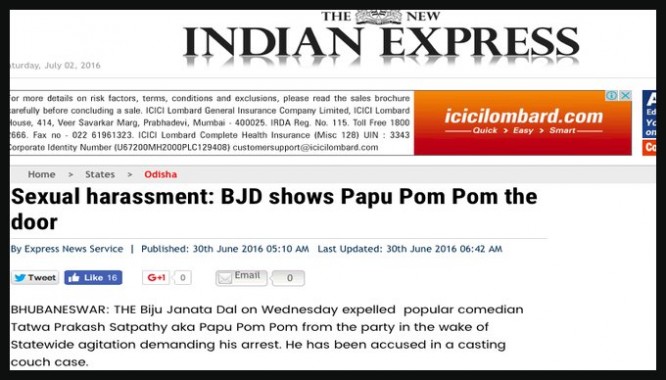The Odisha casting couch smears the ruling BJD
An Ollywood comedian turned politician is accused of sexually abusing a 16 year old minor girl on the pretext of giving her a break to be a film actress. The comedian was expelled from the ruling party on June 29. He joined the ruling Biju Janata Dal and unsuccessfully contested for assembly election in 2014. Both he and his alleged associate were arrested by the Police on June 30.
The Mahila Police Station at Bhubaneswar, capital of Odisha registered two cases relating to allegations of casting couch in Ollywood, (as the Odia film and television industry is known) on June 26 and June 27. While the first case was booked on the basis of a complaint by a female actor against two directors, three producers and an event manager, the second case against the comedian was booked on the basis of complaint filed by a social organization.
The issue of the casting couch syndrome in Ollywood appeared in the public domain during the second week of June after an actress discussed it on TV. Immediately, other television channels and newspapers started elaborate coverage of the subject and artists, directors, producers and commentators all started participating in the discussions. Television channels and newspapers dwelt intensively on the issue almost every day throughout the second half of June.
The actress’ visit to Mahila police station to file the complaint was elaborately covered by the local media. She said she had earlier lodged a complaint against the six film industry persons and ever since they had constantly threatened her. The six accused convened a press conference to deny the charges.
The complaint of the social organization Friends Foundation Trust was followed by a directive by the Child Welfare Committee, a government approved body asking the Bhubaneswar Police to immediately take up the case. The text of the statement of the minor girl on alleged harassment by the actor and his associate over the past three years was covered by television channels and newspapers. Details such as how the actor took her to show a film shooting and tried to misbehave inside the car, offer chocolates on her way to school, and drove a scooter to meet her at the school compound, were published in the newspaper pages.
These allegations come on the heels of claims that certain film stars played a dubious role in facilitating the tainted ponzi financial companies in Odisha which duped thousands of investors. The stars, it is alleged, lured their fans to invest in such companies as brand ambassadors. A few such companies invested in making several Odia films with heavy investments to the tune of Rs 2.5 crore rupees to make a movie.
Immediately before the Casting Couch controversy broke, Ollywood was in the news for the arrest of Pravas Rout of Oskar Finance, a ponzi company which produced several Odia films with ordinary people's money. The main accused Papu Pom Pom was close to Pravas and promoted his company.
Both the casting couch cases and investment by ponzi finance, both of which have been unearthed during May -June 2016, have defamed Ollywood.
Commentators point out that these companies never got back their money but went on to invest in other films. The game played by the company promoters was to be associated with the glamour of the film and television industry in order to attract investors. This led, on the one side, to lavish spending on films which was not recouped - a criminal waste of investors’ money in ponzi schemes - and on the other side, it drove the regular producers out of business because they were not able to make similar investments.
The Odia film industry is 80 years old with 130 cinemas. While only eight films were produced in 2001, the number increased to over 40 in 2015, a phenomenon that has been explained by experts as nothing to do with genuine business growth and more to do with the industry becoming a tool for the brand building efforts of a few producers who have vested interests which include ponzi scheme operators and real estate promoters.
In the process, the creativity of the film industry has been the biggest casualty. Most of the films are crude re-makes of south Indian hits with little original plots, music, or dancing. Odia films are mostly exhibited inside the state. Film production was never a profitable business here due to the limited market; it was more a labour of love or a part time vocation.
On close analysis, one can find the root of the bad culture that overshadows Ollywood in the bygone video era. With the popularization of video, format albums containing non-filmy song and dance sequences became popular in Odisha between 1995 and 2005. With the sole objective of experiencing the glamour of show business, many people who had no relation with film, drama or culture, spent money on producing music videos – money which they never got back.
But the trend thrived for a considerable time and this is the period when the cinematic ethics of the film industry were adversely affected. The dark phase that hangs heavy over the industry today is a magnified version of the trend that was nourished during the album era. A critic in a local newspaper has called it ‘the fire under the ashes’, i.e. something that has the potential to spread a wild fire.
Dr Pradeep Mahapatra is a media critic, teacher, and consultant based in Odisha. He retired as the Head of the Department of Journalism & Mass Communication, Behrmapur University.
